藝評
我們現在何去何從……? | Where Do We Go Now….?
約翰百德 (John BATTEN)
at 3:23pm on 24th June 2020
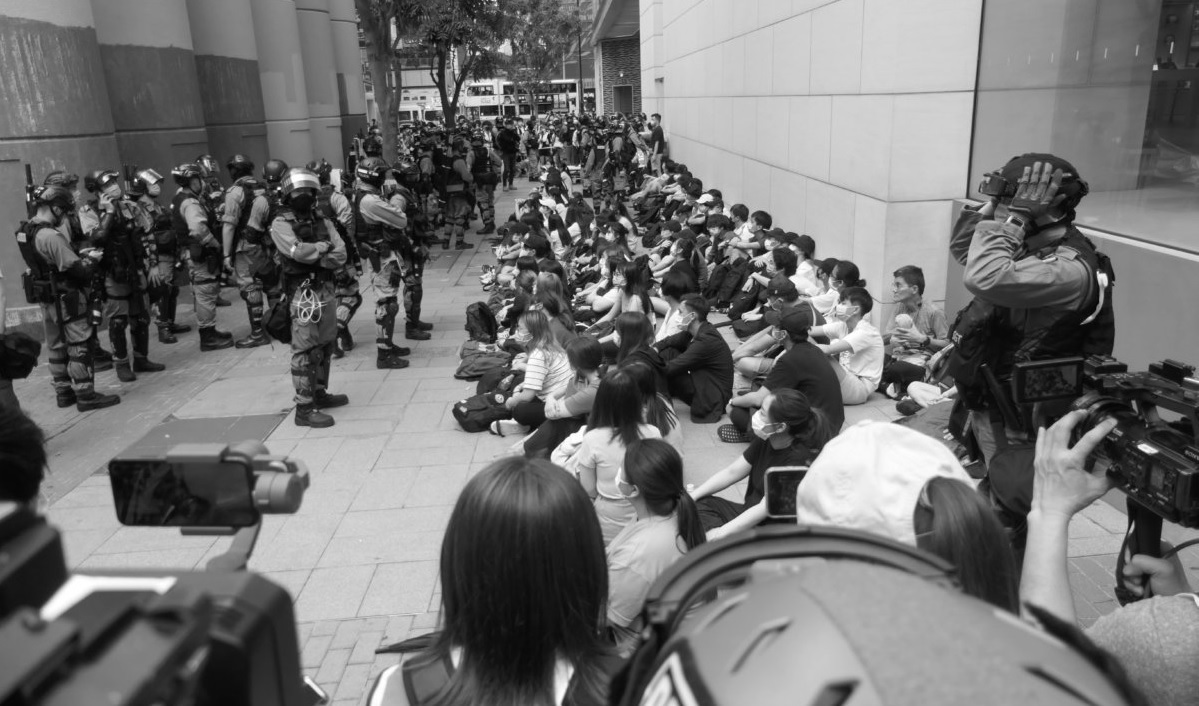
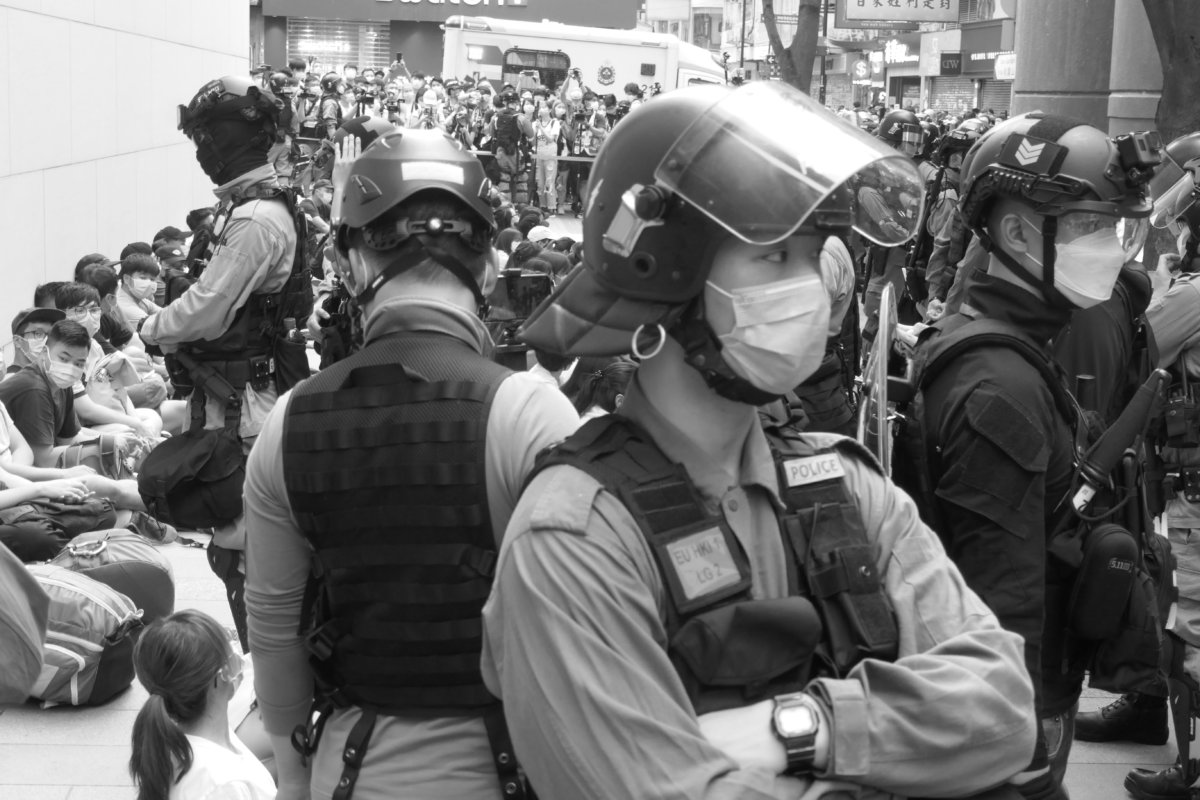
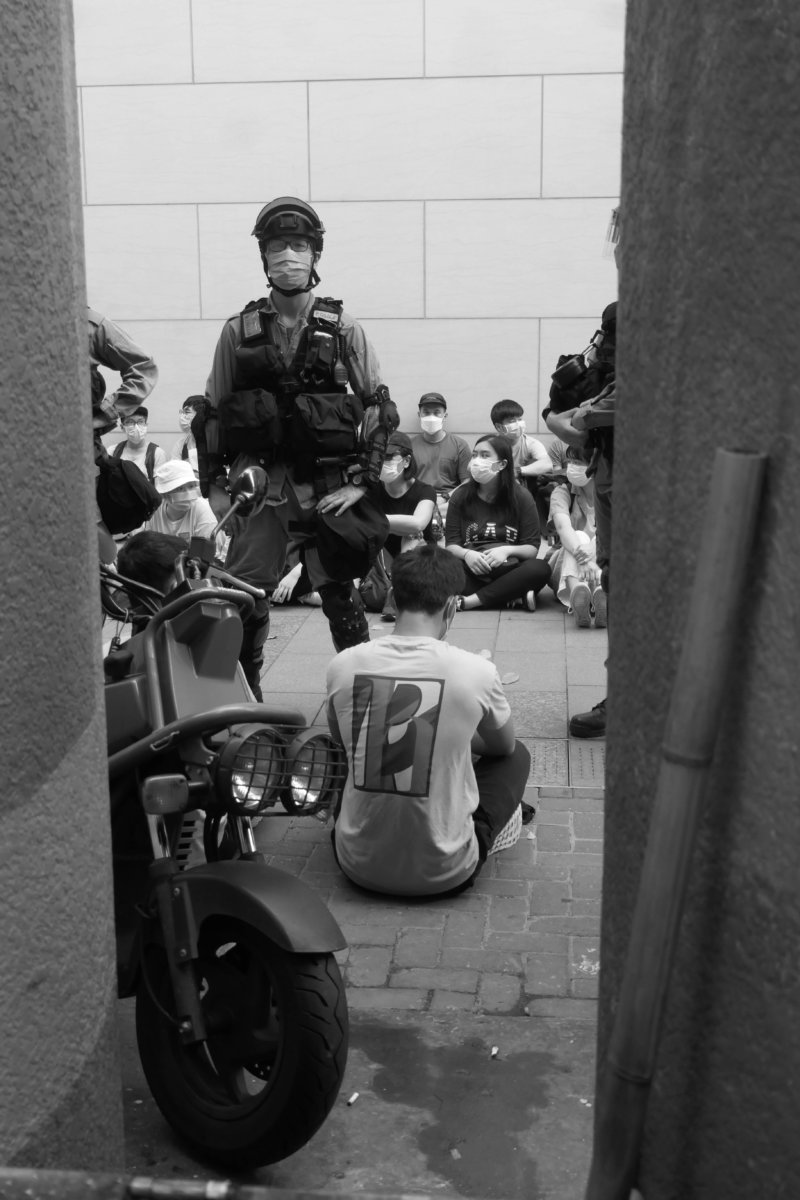
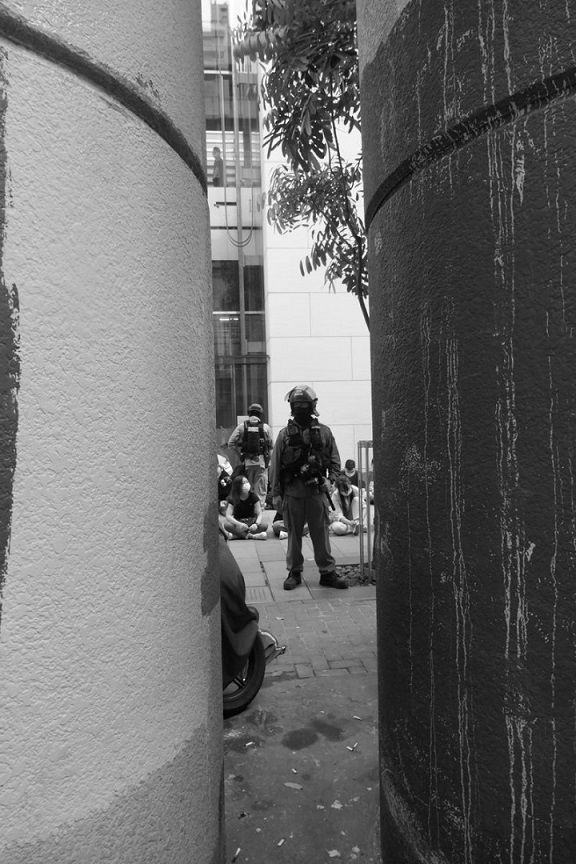
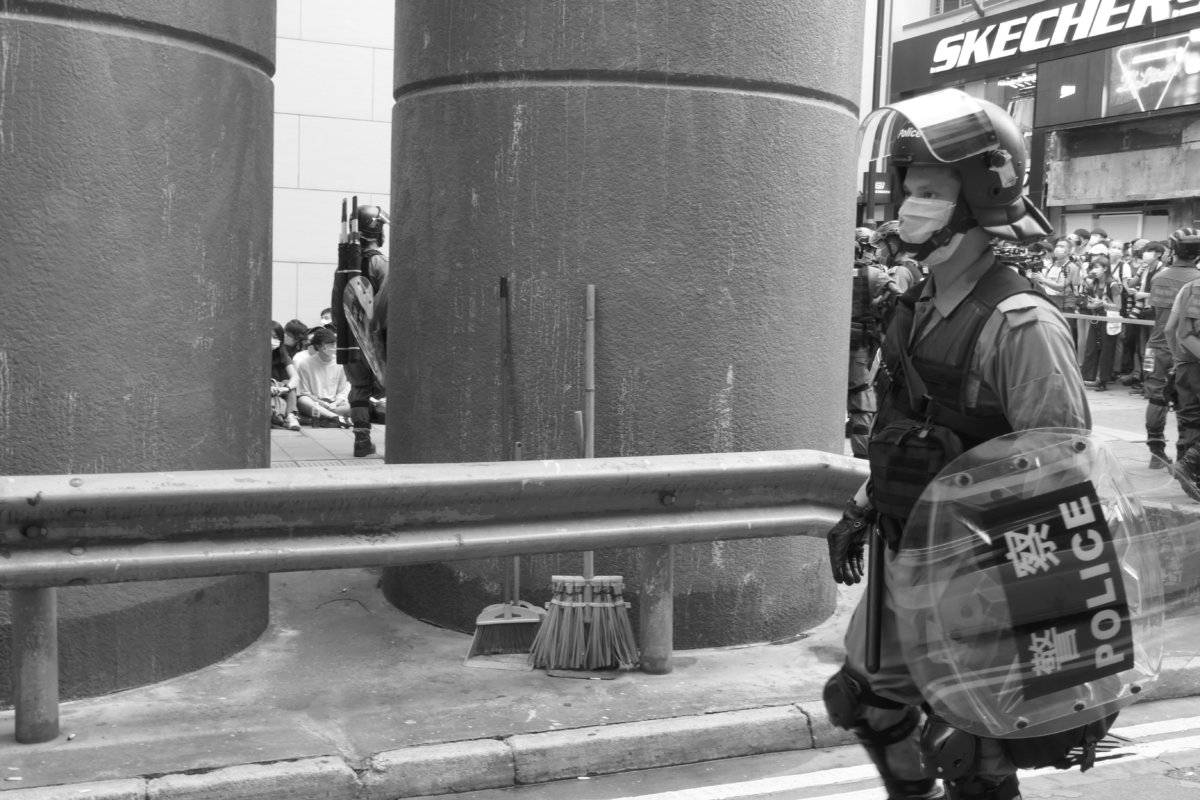
圖片說明:
1.-5. 2020年5月27日,香港銅鑼灣希慎廣場後地面、港鐵大型石屎通風口附近,就國歌法立法示威的年輕示威者被拘留,排成一線。(照片由作者提供)。
Captions:
1.-5. Detained protesters, all just young kids, protesting against national anthem legislation, lined-up on the ground behind Hysan Place and the large concrete MTR air vents, Causeway Bay, Hong Kong, 27 May 2020. (photographs: John Batten)
(Please scroll down for English version)
2019年香港發生示威浪潮期間,報章、社交媒體、電視的報導、文章、分析、照片和錄像多不勝數。每一種角度都有人討論,參與這些全面報導的計有本地和國際新聞機構,也有自由工作者和評論員。聖誕與農曆新年期間示威稍息,首批書冊、相冊和文集也相繼出版。示威期間也有不少低成本雜誌、貼紙、海報和通訊出版。然後,因應2019年新冠病毒而在1月後實施的限制,讓作家、攝影師和出版人有更多時間籌備新一輪以示威為主題的書冊,現在已有不少現身書店。
然而,示威的故事尚未完結。香港示威的另一章現正展開。上星期是香港的重要時刻,就讓我在此重溫。全國人大在只有一票反對下(會不會是不小心碰到投「反對」的按鍵?),通過了人大常委準備頒佈國家安全法,繞過香港立法會直接加入《基本法》, 做法頗具爭議。同時,在立法會上,有關不尊重國歌會成為犯法行為的法例再多走一步,越來越接近通過。然後,美國政府宣佈反對香港國安法立法,認為我城的自治已經受損,並宣佈香港可能失去貿易上的優惠待遇。為了回應這個星期發生的事,示威者再次在街上聚集,但更大規模的警力利用現時新冠肺炎的防疫規定,很快便對聚眾作出拘捕和驅散。
公眾人物的反應顯示了不同政治陣營的兩極化取態,而相關評大都自私自利。例如,黃之鋒呼籲美國和其他國家向香港施加更多經濟制裁,便只是加強了「攬炒」自殘的恐怖手段。諷刺的是,假如香港真的因為這些報復式制裁而受創, 再落得局外人地位,便真的只能夠成為「另一個中國城市」,而世界其他地方對香港的任何特別感情和關心都會消失。一般市民在那種情況下會變成怎樣?與此同時,梁振英因為滙豐銀行未有公開支持國安法立法而呼籲存戶杯葛,則是玩弄愛國主義的做法(一位滙豐高層稍後已公開支持立法)。梁振英擔任特首時,較大力推動「大陸化」,在他領導下的政府推動了在學校和晚間電視播放國歌,還有在所有政府建築物和學校升起國旗,旁邊才是高度較低的香港區旗;還有各紀律部隊與內地更緊密聯繫,以及嘗試在學校引入國民教育。
內地顯然對隨示威出現的暴力忍無可忍,也恐防更多人支持香港獨立,甚至有可能會傳往內地。這就是我們現在身處的境況。我們明白市民和商界都對實施國安法大表關注,因為現時已知細節不多,我們也不清楚這套法例會「硬」還是會「軟」。最重要的,是保持香港的法治和核心價值,包括集會、言論和流動的自由。即將立案的法律含糊不清,是對上述核心價值的考驗,因為魔鬼就在細節中,包括這些法例如何詮釋,還有由誰來任法官(不論他們是官僚和/或司法人員)。
建制陣營自1997年以來便一直控制著政府的立法和行政機關,他們應該對現時由內地施加、引人國家安全立法的方案感到羞恥。多屆政府和建制派政治人物均沒有成功推動足夠討論,然後熟練巧妙地把選擇提交立法會,讓市民得以適當地辯論和考慮。硬闖而非建立共識,是2003年和2004年時所採用的策略,事情自那時起便一直猶豫不決,情況是令人絕望的。自1997年以來,香港的行政領導都都處於弱勢,政府普遍被視為(而很多情況下也確實如此)無能、充斥精英主義,而且偏袒香港的宗族、業界和商界利益。香港的「小人物」,即普羅大眾,在決策上大都被拒諸門外。民主派陣營儘管反對聲音不絕,但從來沒有以替待政府的身份推動有啟發性的另類政策議程。簡單而言,這一切都有需要改變。
我建議一位在海外居住的香港朋友收聽Nick Cave and the Bad Seeds的歌曲《Where Do We Go Now But Nowhere?》(除了無處可去,我們現在何去何從?),它的歌詞捕捉了我們身處的亂局,包括:
「…在鴨塘周圍,我們冷冷地垂頭喪氣
沮喪地、哀痛地,我們再走一圈
再多一次也是厄運,沒有希望
繞著走、繞著走,無處可逃……」 *
這首生動鮮明的情歌也提及「Serenity Prayer」,是美國神學家Reinhold Nierbuhr的作品,他言簡意賅地寫出了採取匿名戒酒會等自救計劃的實際行動。禱文這樣寫道:「天父,請給我們勇氣,改變必須改變的事物,讓我們安然接受改變不了的,也給我們認識彼此的識見。」
# 見本文附圖及以下短片:www.facebook.com/battenjohn/videos/10157506851197371/
* www.nickcave.com/lyric/where-do-we-go-now-but-nowhere/
原文刊於《明報周刊》,2020年6月8日
Where Do We Go Now….?
by John BATTEN
There was a plethora of newspaper, social media, television reports, articles, analysis, photography and video during Hong Kong’s 2019 protests – every angle was discussed: it was a comprehensive coverage undertaken by local and international news organisations, freelancers and commentators. A lull in the protests between Christmas and Chinese New Year saw the first published books and compilations of photography and essays appearing. These joined low-budget zines, stickers, posters and newsletters published throughout the protests. Then, Covid-19 restrictions after January gave writers, photographers and publishers bonus time to prepare a new wave of protest-focused books, which are now being seen in bookshops.
But, the story of the protests has not yet ended. A further chapter of the Hong Kong protests is being played-out right now. Last week was momentous for Hong Kong; let me recap. The National People’s Congress passed, with only one dissenting vote (or, was it just a slipped finger voting ‘no’?), approval for its Standing Committee to prepare the promulgation of national security laws to be directly added to the Basic Law, controversially by-passing Hong Kong’s Legislative Council. Meanwhile, in the Legislative Council, legislation outlawing disrespect of the national anthem came a step closer to being passed. Then, the US government announced its opposition to Hong Kong’s national security legislation, considering that the city’s autonomy was compromised and announced that Hong Kong could lose its trading privileges. This week, in response, protesters gathered again on the streets, but a large police presence used the city’s Covid-19 prevention rules to quickly arrest and disburse crowds.
The reaction from public figures reflected the polarized positions of the different political camps, and, much of that commentary was self-interested. For example: Joshua Wong’s call on the US and other countries to inflict more economic sanctions on Hong Kong merely reinforces a “we burn, you burn” self-defeating nihilism. Ironically, if Hong Kong does suffer such retributive sanctions and takes on an outcast status, the city could really become ‘just another Chinese city’ and any special sentiment and care that the rest of the world has towards Hong Kong will be lost. What happens to the general public in that scenario? Meanwhile, Leung Chun-ying’s call for depositors to boycott HSBC because it has not publicly supported national security legislation is a play on Chinese nationalism (a senior HSBC executive has subsequently supported the legislation). Leung’s tenure as Chief Executive saw a stronger push for Hong Kong’s ‘mainlandisation’, demonstrated by his administration’s push for the national anthem being played at schools and on nightly television; the flying of the national flag alongside a smaller, lower-hung Hong Kong flag on all government buildings and schools; much closer liaison by the city’s disciplined services with the mainland; and, attempts to introduce a national education curriculum in schools.
The mainland is clearly fed-up with the violence of the protests and fears further support for Hong Kong independence, which might cross into the mainland. That is where we are now. Understandably, the public and business is concerned with the implementation of national security legislation, as there are so few details and it is unclear if it will be a ‘hard’ or ‘soft’ set of laws. Of paramount importance is the preservation of Hong Kong’s rule of law, and core values, including freedom of assembly, expression and movement. The vagueness of the forthcoming laws will test those core values as the devil will be in the detail, the interpretation of those laws and who are the judges (be they bureaucratic and/or judicial).
The pro-establishment camp has controlled the executive and legislative branches of government since 1997and should be ashamed that we have come to this current mainland-imposed solution to introducing national security legislation. Successive administrations and pro-establishment politicians failed to adequately discuss and deftly table legislation options for the public to properly debate and consider. Ramming through rather than consensus building was the strategy in 2003 and 2004 and hopeless dithering thereafter. Since 1997, Hong Kong has had weak executive leadership, a government of perceived and, at times, real incompetence, elitism and favouritism towards Hong Kong’s clan, sectoral and business interests. Hong Kong’s ‘small potatoes’, the public, have largely been excluded from decision-making. The pro-democracy camp, despite its belligerent rhetoric, has never acted as an alternative government nor pushed an enlightened alternative policy agenda. Simply said, all this needs to change.
I suggested to a Hong Kong friend living overseas that Nick Cave and the Bad Seeds’ song “Where Do We Go Now But Nowhere?” captured the mess we are in. It contains such lyrics as:
“…Around the duck pond we grimly mope
Gloomily and mournfully we go round again
And one more doomed time and without much hope
Going round and around to nowhere….” *
This poignant love song also mentions the Serenity Prayer, written by the American theologian Reinhold Nierbuhr, whose simple words of practical action has been adopted by such self-recovery programmes as Alcoholics Anonymous. It reads: “Father, give us courage to change what must be altered, serenity to accept what cannot be helped, and the insight to know the one from the other.”
# See attached photographs and this video: www.facebook.com/battenjohn/videos/10157506851197371/
* www.nickcave.com/lyric/where-do-we-go-now-but-nowhere/
This article was originally published in Ming Pao Weekly, 8 June 2020. Translated from the original English text by Aulina Chan.
